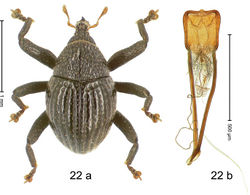Trigonopterus dentirostris
| Notice: | This page is derived from the original publication listed below, whose author(s) should always be credited. Further contributors may edit and improve the content of this page and, consequently, need to be credited as well (see page history). Any assessment of factual correctness requires a careful review of the original article as well as of subsequent contributions.
If you are uncertain whether your planned contribution is correct or not, we suggest that you use the associated discussion page instead of editing the page directly. This page should be cited as follows (rationale):
Citation formats to copy and paste
BibTeX: @article{Riedel2013ZooKeys280, RIS/ Endnote: TY - JOUR Wikipedia/ Citizendium: <ref name="Riedel2013ZooKeys280">{{Citation See also the citation download page at the journal. |
Ordo: Coleoptera
Familia: Curculionidae
Genus: Trigonopterus
Name
Trigonopterus dentirostris Riedel sp. n. – Wikispecies link – ZooBank link – Pensoft Profile
Diagnostic description
Holotype, male (Fig. 22a). Length 1.65 mm. Color black; antenna and tarsi ferruginous. Body subovate; in dorsal aspect without constriction between pronotum and elytron; in profile with distinct constriction. Rostrum at base with median ridge and pair of submedian ridges; at middle with anteriorly hollowed protuberance dorsally bearing pair of denticles; between protuberance and epistome relatively flat, with sparse erect scales; epistome at middle with dorsoposteriad directed horn. Pronotum punctate-rugose, each puncture containing one narrow transparent scale; medially with indistinct ridge. Elytra with striae deeply impressed; punctures large, each containing one downcurved seta; intervals weakly costate, subglabrous. Metafemur dorsoposteriorly simple, subapically without stridulatory patch. Aedeagus (Fig. 22b). Body widening to shortly before apex; medially weakly extended; endophallus denticulate; transfer apparatus spiniform, curved; ductus ejaculatorius with weak bulbus. Intraspecific variation. Length 1.65–1.92 mm. Female rostrum dorsally even, without teeth or cavities, medially subglabrous, sublaterally punctate.
Material examined
Holotype (MZB): ARC0538 (EMBL # FN429244), WEST NEW GUINEA, Jayapura Reg., Cyclops Mts, S02°31.594', E140°30.407', 1065 m, 21-XI-2007, sifted. Paratypes (ARC, SMNK, ZSM): WEST NEW GUINEA, Jayapura Reg., Cyclops Mts, Sentani: 2 exx, ARC0544 (EMBL # FN429250), S02°31.683', E140°30.281', 960 m, 21-XI-2007, sifted; 6 exx, ARC0545 (EMBL # FN429251), Sentani, S02°31.776', E140°30.215', 945 m, 21-XI-2007, sifted; 1 ex, Sentani, S02°31.603', E140°30.434', 1095 m, 28-XI-2007, sifted; 2 exx, Sentani, 950–1450 m, 03-X-1992; 6 exx (1 marked ARC0026), Sentani, 1000 m, 23-XII-2004, sifted; 1 ex, Sentani, 1100 m, 23-XII-2004, sifted; 3 exx, ARC1690 (EMBL # HE615977), ARC1691 (EMBL # HE615978), Angkasa indah, S02°30.346', E140°42.087', 490 m, 28-VI-2010, sifted.
Distribution
Jayapura Reg. (Cyclops Mts). Elevation: 490–1095 m.
Biology
Sifted from leaf litter in montane forest.
Etymology
This epithet is based on a combination of the Latin nouns dens (tooth) and rostrum (snout) and refers to the dorsal protrusions of the rostrum.
Notes
Trigonopterus dentirostris Riedel, sp. n. was coded as “Trigonopterus sp. 49” by Riedel et al. (2010)[1] and Tänzler et al. (2012)[2], respectively “Trigonopterus spaw” in the EMBL/GenBank/DDBJ databases.
Original Description
- Riedel, A; Sagata, K; Surbakti, S; Rene Tänzler, ; Michael Balke, ; 2013: One hundred and one new species of Trigonopterus weevils from New Guinea ZooKeys, 280: 1-150. doi
Other References
- ↑ Riedel A, Daawia D, Balke M (2010) Deep cox1 divergence and hyperdiversity of Trigonopterus weevils in a New Guinea mountain range (Coleoptera, Curculionidae). Zoologica Scripta, 39 (1): 63-74. doi: 10.1111/j.1463-6409.2009.00404.x
- ↑ Tänzler R, Sagata K, Surbakti S, Balke M, Riedel A (2012) DNA barcoding for community ecology - how to tackle a hyperdiverse, mostly undescribed Melanesian fauna. PLoS ONE 7 (1): e28832. doi: 10.1371/journal.pone.0028832
Images
|
